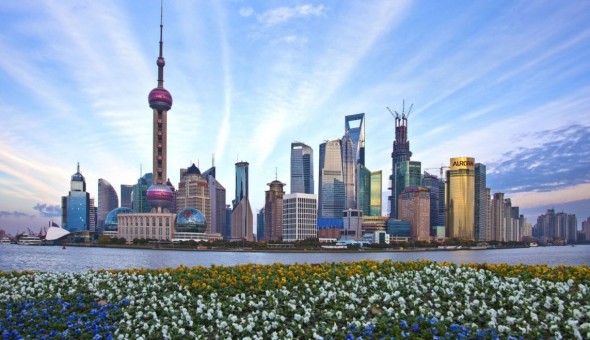11.10.2016
The transfer of the geopolitical center of gravity to Eurasia is something the West will have to get used to
William Engdahl is strategic risk consultant and lecturer, he holds a degree in politics from Princeton University and is a best-selling author on oil and geopolitics, “New Eastern Outlook”
I recently returned from a fascinating two week speaking tour in China. The occasion was the international premier of my newest book, One Belt, One Road–China and the New Eurasian Century.
In the course of my visit I was invited by China’s Northwest University in Xi’an to give a lecture and seminar on the present global political and economic situation in the context of China’s New Economic Silk Road as the One Belt, One Road project is often called.
What I’ve seen in my many visits to China, and have studied about the entirety of this enormously impressive international infrastructure project convinces me that a Eurasian Century at this point is unstoppable.
The idiotic wars of the Washington war-hawks and their military industry–in Syria, in Ukraine, Libya, Iraq and now the South China Sea provocations against China–are not going to stop what is now clearly the most impressive and economically altering project in more than a century.
The term “American Century” was triumphantly proclaimed in a famous editorial in Life magazine in 1941 in the early phase of World War II, before the United States had even entered the war, to describe the system publisher Henry Luce saw dominating the postwar world after the fall of the rival British Empire.
The American Century has lasted a mere seven decades if we date from the end of the war. Its record has been one of dismal failure on balance. The industrial base of the United States, the predominant leading industrial nation and leading scientific innovator, today is a hollowed, rotted shell with once-booming cities like Detroit or Philadelphia or Los Angeles now burned-out ghettos of unemployed and homeless.
The Federal Debt of the United States, owing to the endless wars its Presidents engage in, as well as the fruitless bailouts of Wall Street banks and Government Sponsored Enterprises like Fannie Mae, is well over 103% of GDP at an astonishing $19.5 trillion, or more than $163,000 per taxpaying American and Washington is adding to the debt this year at near $600 billion. Countries like China and Russia are moving away from subsidizing that debt at a record pace.
America’s economic basic infrastructure–bridges, sewer and water treatment plants, electric grid, railways, highways–have been neglected for more than four decades for a variety of reasons.
The American Society of Civil Engineers recently estimated that gross domestic product will be reduced by $4 trillion between 2016 and 2025 because of lost business sales, rising costs and reduced incomes if the country continues to underinvest in its infrastructure. That is on top of the fact that they estimate the country at present urgently requires new infrastructure investment of $3.3 trillion by the coming decade just to renew.
Yet US states and cities are not able to finance such an investment in the future in the present debt situation, nor is the debt-choked Federal Government, so long as a cartel of corrupt brain-dead Wall Street banks and financial funds hold America to ransom.
This is the sunset for the American Century, a poorly disguised imperial experiment in hubris and arrogance by a gaggle of boring old patriarchs like David Rockefeller and his friends on Wall Street and in the military industry. It is the starkest contrast to what is going on to the east, across all Eurasia today.
Flowing the Thought to Transform
The Eurasian Century is the name I give to the economic emergence of the countries contiguous from China across Central Asia, Russia, Belarus, Iran and potentially Turkey. They are being integrally linked through the largest public infrastructure projects in modern history, in fact the most ambitious ever, largely concentrated on the 2013 initiative by Chinese President Xi Jinping called the One Belt, One Road initiative or OBOR.
The project and its implications for Europe and the rest of the world economy have been so far greeted in the west with a stone silence that defies explanation.
It’s been now three years that have transpired since then-new Chinese President Xi Jinping made one of his first foreign visits to Kazakhstan where he discussed the idea of building a vast, modern network of high-speed train lines crossing the vast Eurasian land space from the Pacific coast of China and Russia through Central Asia into Iran, into the states of the Eurasian Economic Union, principally Russia and potentially on to the select states of the European Union.
That initial proposal was unveiled in detail last year by the National Development and Reform Commission (NDRC), China’s economic planning organization, and the ministries of Foreign Affairs and Commerce.
It’s a useful point to look now more closely at what has transpired to date. It reveals most impressive developments, more because the development process is creative and organic. The great project is no simple blueprint made by the Central Committee of the Communist Party of China and then simply imposed, top down, across the so-far 60 countries of Eurasia and South East Asia.
An international conference was recently held in Xi’an, origin of the ancient version of One Belt, One Road, namely the Silk Road. The purpose of the international gathering was to review what has so far taken place.
It’s fascinating, notably, in the care that’s being taken by China to do it in a different way, as indications so far are, different from the way American Robber Barons like Cornelius Vanderbilt, E.H. Harriman, Jay Gould or Russell Sage built rail monopolies and deluded and defrauded investors with railroad monopolies more than a century ago.
The seminar, titled the Belt and Road Initiative (BRI): Shared Memory and Common Development, on September 26th, brought together over 400 participants from more than 30 countries including government officials, universities, corporations, think tanks and media.
A key role is being played by Renmin University of China’s Chongyang Institute for Financial Studies to identify progress and problems of the OBOR project. Their report in Xi’an presented principles underlying the OBOR international project: It adheres to the principles of the UN Charter; it is completely open for new participant nations to cooperate; it will follow market rules and seek mutual benefit of participating countries.
Those are noble words. What’s more interesting is the flow process underway to realize such words and to build the mammoth game-changing infrastructure.
Notably, China’s Xi Jinping decided to encourage input from sources other than the state central planning agency or the Communist Party for the complex OBOR. He encouraged creation of private and independent think-tanks to become a source of new creative ideas and approaches.
Today there is a Chinese Think Tank Cooperation Alliance group coordinating efforts around OBOR headed by the dean of the Renmin University. In turn they partner with think tanks along the OBOR route including think tanks in Iran, Turkey, India, Nepal, Kazakhstan and other countries.
There will be two main routes of the OBOR. On land there are several routes or corridors in work. The Initiative will focus on jointly building what is being called a new Eurasian Land Bridge from China via Kazakhstan on to Rotterdam. Other OBOR land rail corridors include developing China-Mongolia-Russia, China-Central Asia-West Asia, China-Pakistan, Bangladesh-China-India-Myanmar, and China-Indochina Peninsula economic corridors.vThis is huge.
It will build on international transport routes, relying on core cities along the OBOR route and using key economic industrial parks as “cooperation platforms.”
At sea, the Initiative will focus on jointly building smooth, secure and efficient transport routes connecting major sea ports along the “Belt and Road” including modern upgraded super port construction that will link present China ports at Haikou and Fujian with Kuala Lumpur’s port in Malaysia at the Malacca Strait passage, Calcutta in India, Nairobi in Kenya and via the Suez Canal to Athens and beyond. Crucial is that land and sea parts of OBOR are seen as one whole circulatory system or flow of trade.
The OBOR Initiative will link key Eurasian ports with interior rail and pipeline infrastructure in a way not before seen
To date China has signed memoranda of understanding with 56 countries and regional organizations regarding OBOR. Since his initial proposal in 2013, President Xi Jinping has personally visited 37 countries to discuss implementation of OBOR. China Railway Group and China Communications Construction Company have signed contracts for key routes and ports in 26 countries.
Power plants, electricity transmission facilities and oil and gas pipelines, covering 19 countries along the “Belt and Road” in some 40 energy projects have begun. China Unicom, China Telecom and China Mobile are speeding up cross-border transmission projects in countries along the “Belt and Road” to expand international telecommunication infrastructure.
Already, taking the full sea and land routes of OBOR, some $3 trillion of China trade since June 2013 has flowed over the route, more than a quarter of China’s total trade volume.
To date China has also invested more than $51 billion in the countries along the present OBOR route. The new land rail routes will greatly reduce transportation costs across Eurasia, enable formerly isolated regions to connect efficiently to sea and land markets and ignite tremendous new economic growth across Eurasia.
0217-china-high-speed-rail
The effects of the OBOR are already beginning to appear. Earlier this year an Iranian container ship arrived at Qinzhou Port in China with 978 containers from several countries along the 21st-Century Maritime Silk Road opening the first shipping route linking the Middle East and the Beibu Gulf or Gulf of Tonkin in Vietnamese.
In February 2016 a container train with Chinese goods took only 14 days to complete the 5,900 mile (9,500km) journey from China’s eastern Zhejiang province through Kazakhstan and Turkmenistan.
That was 30 days shorter than the sea voyage from Shanghai to the Iranian port of Bandar Abbas, according to the head of the Iranian railway company. China and Iran, now formally part of the OBOR, have targeted bilateral trade, none in US dollars by the way, to exceed $600 billion in the coming decade.
China is presently in negotiations with 28 countries China is in talks with 28 countries including Russia, on high-speed rail projects, China’s train maker, China CNR reports.
It includes a major joint China-Russia $15 billion high-speed Kazan to Moscow line. The 770 kilometers of track between Moscow and Russia’s Tatarstan capital, Kazan, will cut time for the journey from 12 hours now to just 3.5 hours. China has agreed to invest $6 billion in the project which would become a part of a $100 billion high-speed railway between Moscow and Beijing.
Notably, for the new high-speed track being laid, China is developing a new generation of trains capable of reaching speeds of 400 kilometers per hour. And the new trains will solve the costly rail gauge switching problem between China rails and Russian.
Trains in Russia run on a 1520mm track, compared to the narrower 1435mm track used in Europe and China. Jia Limin, the head of China’s high-speed rail innovation program told China Daily that, “The train… will have wheels that can be adjusted to fit various gauges on other countries’ tracks, compared with trains now that need to have their wheels changed before entering foreign systems.”
Given its strategy of building thousands of kilometers of high-speed railways and developing its domestic Chinese rail sock manufacture as well as other rail technology, China today is the world’s leading producer of rail technology.
Financing the moving
Impressive is that China has secured capital commitment for the OBOR from various sources including the China Development Bank, Export-Import Bank of China, the China-initiated Asian Infrastructure Investment Bank, the BRICS New Development Bank and other sources including its Silk Road Fund to finance the huge undertaking.
The Silk Road Fund has posted $40 billion to fund the OBOR projects. So far close to a quarter trillion US dollars of ready money and another half trillion in supranational institutional working capital is reasonably within reach.
The Western doomsday reports of China’s economy going down the tubes are simply either self-serving propaganda of hedge funds or speculators or fed by lack of understanding of the profound transformation in the entire structure of not only China’s but all Eurasia’s economy through the One Belt One Road initiative. China is undergoing a major transformation from a cheap-labor screwdriver assembly nation to a high-value-added high-tech manufacturer.
Geopolitical transformation
The One Belt, One Road initiative of Xi Jinping and the Eurasian partners, especially Russia, also has strategic dimensions of major import. The construction of new infrastructure corridors spanning across the Eurasian landmass in the form of highways, railways, industrial parks, and oil and gas pipelines, OBOR is connecting for the first time in the modern era landlocked regions of hinterland China and Russia and Central Asia republics with the sea ports.
Linking key Eurasian industrial hubs to ports with efficient transportation will revolutionize connectivity of hinterland industrial products and raw materials of every kind. The Russian and Eurasian lands, including China, contain perhaps the richest untapped concentration of every raw material known.
The One Belt, One Road also includes oil and gas pipeline transportation corridors. In January 2015 the Myanmar-China Pipeline project, 2400 km long, was completed, linking Myanmar’s deep-water port of Kyaukphyu on Maday Island in the Bay of Bengal with Kunming in Yunnan province in southeast China near Myanmar’s border.
It’s a joint project of the China Development Bank and Myanmar Foreign Investment Bank. The new pipeline allows China to import up to 400,000 barrels a day of Middle East oil over a route 1100 km shorter than the previous Malacca Strait sea route, reducing time to reach the large industrial hub city of Kunming by 30%, major economic gains, and avoiding the strategic chokepoint of the Malacca Strait where the US Navy’s Sixth Fleet dominates.
Previously, 80% of Chinese oil and gas imports crossed the Malacca straits and were subject to US controls. Were the present escalating tensions between Washington and China over the South China Sea or other issues to escalate, China would be brought to her knees much like Japan prior to declaring war in 1941, when the USA embargoed her oil. A second pipeline brings natural gas from Qatar and Myanmar gas fields to China.
The OBOR includes oil and gas pipelines that reduce time and distance to imports of Middle East oil and gas
China will pay $53 billion to Myanmar in pipeline royalties over 30 years. They will also invest $25 million in schooling and other social development projects along the pipeline and 10% of the gas will stay in Burma.
Mackinder Outflanked?
The totality of the strategy behind Xi Jinping’s Eurasian One belt, One Road rail, sea and pipeline initiative, which is moving quietly and impressively forward, is transforming the world geopolitical map. In 1904 a British geographer, Sir Halford Mackinder, a fervid champion of the British Empire, unveiled a brilliant concept in a speech to the London Royal Geographical Society titled the Geographical Pivot of History.
That essay has shaped both British and American global strategy of hegemony and domination to the present. It was complemented by US Admiral Alfred Thayer Mahan’s 1890 work, The Influence of Sea Power Upon History, which advocated “sea power,” stating that nations with domination of the seas, as the British Empire or later the USA, would dominate the world.
The One Belt, One Road, by linking all the contiguous land areas of Eurasia to the related network of strategic new or enlarged deep-water ports of OBOR’s Maritime Silk Road, has rendered US geopolitical strategy a devastating blow at a time the hegemony of America is failing as never in its short history.
The Eurasian Century today is inevitable and unstoppable. Built on different principles of cooperation rather than domination, it just might offer a model for the bankrupt United States and the soon-bankrupt European Union, to build up true prosperity not based on looting and debt slavery Source:.
http://www.4thmedia.org/2016/10/the-eurasian-century-is-now-unstoppable/


